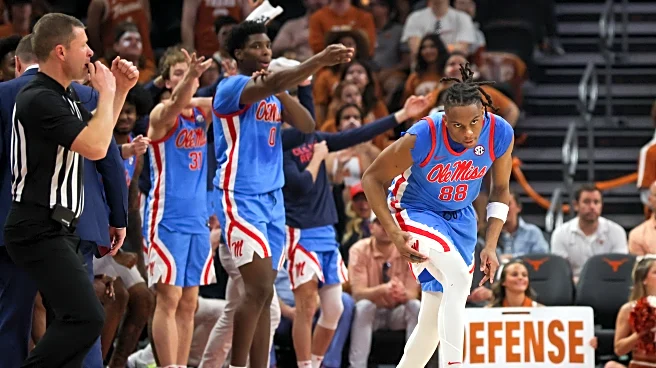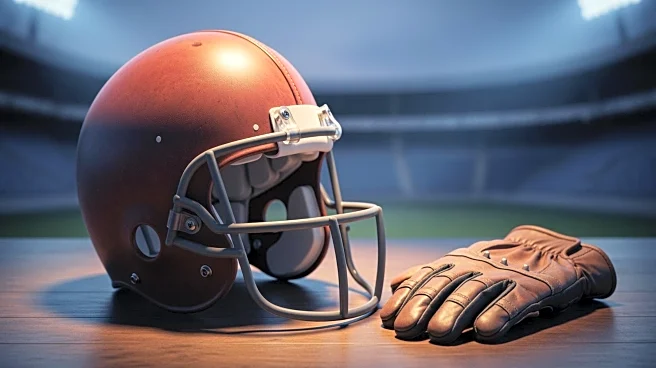
At around the same time the Buss family announced they were selling a controlling interest in the Lakers to Mark Walter, who owns the baseball team across town, a fan of the Washington Nationals tweeted
this possibility to his followers ...
Reportedly Joe & Clara Wu Tsai owners of the Brooklyn Nets and New York Liberty, would buy out the Washington Nationals tomorrow and or shares of the Tanenbaum, but the price is too high, per sources pic.twitter.com/fTcQi2uRM4
— optimistic nats fan (@optimistic5518) June 18, 2025
It was just a rumor — and we suspect that photo is AI-generated. The Washington Nationals are not currently for sale and there’s no indication, the Tsais are interested in baseball, as far as we know.
Still, the tweet is a reflection of how the sports scene is starting to view the Tsais: as a power couple who have an ever increasing appetite for sports assets ... centered on the corner of Flatbush and Atlantic but with wider horizons both by sport and geography.
In an exclusive interview with NetsDaily, Tsai said that pro sports assets are a favorite investment of his and his “family office,” Blue Pool Capital, which manages his and Clara Wu Tsai’s wealth, estimated as somewhere between $9 and $12 billion. Some of the strategy is personal; he loves sports. But it’s more business than personal and Joe Tsai is a very, very successful businessman.
“Soaring team values is a phenomenon in the top-tier leagues like NFL and NBA,” Tsai told ND. “These franchises trade like art – valuation is based on supply and demand as opposed to profits or cash flow. Demand far outstrips supply, and supply is strictly controlled and limited (that’s why they’re called ‘franchises’). The cachet of owning a team in a top league is always attractive to people who can afford it.’
And he is one of those people ... as he noted, “There are 30 NBA franchises and 3,000 billionaires in the world.”
Quietly over the last decade, the 61-year-old co-founder and chairman of Alibaba and his wife have acquired control or pieces of teams in the NBA, WNBA, MLS, indoor and outdoor lacrosse leagues as well as things like esports, sports data and analysis, digital sports of all kinds ... and the world’s third highest grossing venue in Brooklyn, N.Y. The number and value of their assets continues to rise, even accelerate with several new investments coming in the last month or two. Overall, the strategy is just now being noticed.
Indeed, the latest Bloomberg News breakdown of Tsai’s net worth, which it estimated at $9.1 billion, puts the value of his sports assets, primarily the holdings of Brooklyn Sports and Entertainment, at a conservative $4.85 billion, amounting to 52% of his overall holdings. Bloomberg valued his holdings in Alibaba — 1.4% of the Chinese e-commerce giant’s stock — at nearly a billion dollars less: $3.95 billion. (Rounding out the estimate, said Bloomberg, is his New York real estate, primarily in apartments on Billionaires’ Row overlooking Central Park.)
Their sports investments are far from random or based on fandom, although Tsai admits his lacrosse holdings have been a “passion project.” He played the sport both at Lawrenceville School in New Jersey and Yale.
Ollie Weisberg, who runs Blue Pool Capital, the family’s Hong Kong-based investment office, and is an alternate governor of the Nets, signaled last year that he — and the Tsais — see sports as an asset class of its own.
“When I think about about my marginal dollar today, sports is at the top of the list. Sports has become an actual asset class now,” Weisberg told Asian Investor magazine in an interview a year ago April. “We believe that the rising interest in live sports, and the increasing growth in media rights, that’s something we’re super excited about. It’s not just the NFL, the NBA, the NHL. It’s women’s soccer, women’s basketball.”
Tsai put it more succinctly in his ND interview.
“My sports investment philosophy: Invest in leagues where the best players in the world play – e.g, NBA, WNBA, NFL...”
It’s more than that, of course, as NetsDaily’s close reading of where he’s putting his money shows. Some of his investments are small, experimental forays into businesses to see if he likes what they offer. Others have helped business partners enter the Chinese sports space. He likes working with former sports superstars, too. But Tsai’s biggest investments emphasize the entertainment play. He’s taking the game outside the arena and wants to create “festival”-like fan experiences in a space his companies control ... destinations His biggest asset in Brooklyn and his newest investment in Miami both speak to that.
One of North America’s leading sports economists, Mark Rosentraub, Professor of Sports Management at Michigan University, explained to NetsDaily where Tsai sits in the history of the sports ownership noting that it’s always about leveraging the big sports investments in particular to generate income to pay for players’ salaries, always the biggest cost.
“Our professional sports began as vehicles to sell beer,” said Rosentraub. “That’s what’s professionalized the Cincinnati Red Stockings. Every time player salaries rose for any number of factors, owners always try to leverage sports for other things. So we went into advertising first. That was the outfield, the advertising on the walls. Then we went into radio, then to television. And what owners are doing now is, again, adapting or leveraging sport for other activities to generate income. It’s just simply the latest iteration of what began in 1867.”
“I think that what he has done is quite innovative. the next generation,” Rosentraub said. Tsai like other billionaire owners of sports teams is expanding the history “with a a venue operation that runs 24/7, 12 months a year. And so and what’s happening again in the last ...I put it like 10 years ... has now been the internationalization of these things.”
Each of the big sports “empires”, the 25 or so that control an increasing number of teams around the globe, offers a different mix of assets, driven by opportunity as well as geography and, yes, fandom. While the growth of those empires has gotten a lot of positive press of late, there is a downside too, notes Stefan Szymanski, Rosenstraub’s U of Michigan colleague and fellow sports economist. Pro sports is becoming a monopoly controlled by billionaires.
“Sports wasn’t a big business for a very long time. It’s still not a large business when you compare it to, say the S&P 500,” Szymanski told ND. “It’s not that long ago that they were tiny businesses. They’ve really grown like topsy. And it now relies more and more on the very wealthy.”
It’s a double-edged sword for fans. Having a super rich owner as opposed to just very rich one — think Tsai or Mikhail Prokhorov vs. Bruce Ratner — provides teams with stability and resources, but the cost of being a fan keeps rising: tickets, merchandise, and especially the growing number of streaming services are limiting who can attend or even watch. By one recent estimate, being even a casual fan can cost up to $5,000 a year.
An ND compilation of Tsai’s investments, culled from various sources, including our interview with Tsai, public records and news accounts, shows the diversity of the strategy that the Tsais and Weisberg have pushed as well as its acceleration and enormity.
Brooklyn Sports and Entertainment
At the top of the list, of course, is the 85% ownership of Brooklyn Sports and Entertainment which controls the Brooklyn Nets, the New York Liberty and Barclays Center as well as lesser known assets like the retail space at the base of the Williamsburgh Savings Bank and a minority interest in the nearby Brooklyn Paramount Theatre. All of them and not doubt other greater or lesser businesses are destined to be part of a large-scale, venue-based multi-billion dollar complex.
Details remain vague, but it could ultimately include a hotel, restaurants, conference center, marketplace, community basketball center and supportive media operations, It’s what Brooklyn Sports and Entertainment CEO, Sam Zussman, calls a “ecosystem” or “destination” modeled on the billion dollar LA LIVE! built around what used to be called Staples Center.
“It’s a vision where you’re coming here; you can stay at our hotel; you can go to our game; you can dine at a restaurant; you can do a conference at our conference center; you can go to the magic show venue; you can go have a drink at our bar,” Zussman said when first broaching the idea last October. “And you’re constantly in our ecosystem.”
One indication or the Tsais’ success and potential in New York professional sports: BSE’s possibilities have proven attractive to some of the world’s richest individuals. Last June, the Tsais sold 15% of Brooklyn Sports and Entertainment to members of the Koch family led by Julia Koch, the world’s third richest woman, and her eldest child, David Koch Jr, who’s now learning the trade as a basketball operations assistant at HSS Training Center. The purchase price was a reported $688 million. Some is being used to retire team debt but also to finance arena enhancements costing between $100 and $150 million over the next five years, the first brick-and- mortar piece in the planned ecosystem.
Then two months ago, Blue Pool sold a piece of the Liberty — according to Bloomberg in the “mid-teens” range — to a group of investors led by Jack Ma, the sixth richest man in China and the lead co-founder of Alibaba. The price was undisclosed but some guestimating would indicate a $40 million outlay by Ma and the group of five women business leaders. This money will also be used to help defray the cost of another brick-and-mortar investment: the Libs’ new $80 million training facility in Greenpoint.
It’s not an exaggeration to say the Tsais are the among most powerful owners if not the most powerful owners in the WNBA. The league’s ownership structure is divided into three pieces: the owners of the 13 WNBA franchises hold 42%; owners of the 30 NBA franchises hold another 42% and a group that invested in the league back in 2022 controls 16%. The Tsais are part of all three. Only Washington’s Ted Leonsis shares that distinction.
Not surprisingly, Tsai declined comment when asked about the state of the current CBA negotiations. How significant a role he will play remains uncertain. Wu Tsai has said she’s not involved.
At the core of the plans for whatever form the ecosystem takes is its most attractive element: the Nets and Liberty. Tsai describes why he thinks the NBA and WNBA are great cornerstones.
“Beyond the scarcity of the product, the economic structure of salary cap, revenue share, systems to ensure competitive parity within the league, TV/streaming contracts and international appeal all add to the value of the NBA,” he told us.
Tsai sees Brooklyn Sports and Entertainment as something bigger than basketball though, a compilation of IPs — intellectual properties — that are exclusive and thus more valuable. He emphasizes the “entertainment” in the company name.
“It’s a venue-based entertainment company with proprietary IP. Venues – Barclays Center, Brooklyn Paramount, One Hanson Place. Proprietary IPs – Brooklyn Nets, New York Liberty, Ellie (!), Planet Brooklyn Fest and more!” (Planet Brooklyn Fest, a two-day, three-venue musical celebration featuring block parties was first announced by BKMag, also part of the proposed “ecosystem.”)
Miami Dolphins
Tsai’s biggest investment beyond BSE is his separate two percent stake in the Miami Dolphins as well as the other sports and entertainment entities controlled by Dolphins owner Steve Ross: things like the Hard Rock Stadium and a Formula 1 circuit etc. The stake was purchased in December 2024 from Ross, the NFL team’s long-time owner.
Tsai and Weisberg originally combined to acquire three percent but then two months ago, Tsai sold a third of that — one percent — to unidentified businessmen, no doubt at a profit. Again, no details on how much he paid (or how much he received) but another good guestimate is that the value of the stake is in the low nine-figure range, roughly $200 million.
Earlier this month. the Dolphins organization expanded even further, buying a 45% stake in the Miami Open, a premier if non-Grand Slam tennis event, giving Tsai a small piece of pro tennis tournaments as well as Formula 1, both of which are as much those coveted venue-based “festivals” as they are competitive sports.
“Investment in the Miami Dolphins is an easy financial decision,” Tsai told ND. “Steve Ross put together a terrific group of assets – NFL (massive TV contract), Hardrock Stadium (Taylor Swift concerts), Miami Formula 1, Miami Open tennis tournament – and he has a great management team.”
There’s no pathway to ownership for Tsai. Ross has been grooming his daughter, Jennifer, to succeed him.
LAFC
Tsai has long held a small piece of the LAFC in Major League Soccer, buying in before he invested in the Nets. On one hand, it’s a vanity holding. Among the other high-powered Southern California sports and Hollywood celebrities with pieces are Magic Johnson, Will Ferrell, Mia Hamm, her husband, former Red Sox shortstop Nomar Garciaperra as well as executives of the Los Angeles Dodgers, Dallas Mavericks, Golden State Warriors, UFC and WWE. On the other hand, it was a way for Tsai to get an understanding of how the MLS works before going deeper in the sport of soccer. Note that he hasn’t.
Lacrosse Leagues
Lacrosse is, as noted, a “passion” investment for Tsai, lacrosse’s biggest advocate in the United States. He owns pieces of the Las Vegas Desert Dogs and San Diego Seals franchises in the National Lacrosse League (indoor) and a significant chunk of the unitary Premier Lacrosse League (outdoor).
His investments in lacrosse goes beyond owning pro teams. He financed Yale’s $40 million Tsai Lacrosse Field House which opened in 2021. When in 2016, the World Lacrosse Federation decided to seek renewed Olympic status for the sport. Tsai pledged $2.5 million to its operating budget. In 2028, lacrosse will make its return to the Olympics in Los Angeles after a 120-year hiatus.
E-Sports
Blue Pool made an investment in 2019 — along with Los Angeles Clippers owner Steve Ballmer and others — in G2 Sports, a Berlin-based esports company. Again, like the LAFC investment, an opportunity to see how esports is run. And again, note that he hasn’t gone before
Sports Support Systems
Blue Pool has also put money in what might be considered ancillary sports services. Early on in his pursuit of sports assets, he acquired a piece of Fanatics, Michael Rubin’s $30 billion digital sports empire that has its hands in everything from apparel to gambling; as well as a piece of Genius Sports, which supplies sports data to virtually every pro league and owns Second Spectrum, every crazed basketball fan’s go-to site for analytics.
In January, he acquired what may not be a pure sports play a piece of Golden Goose, the Italian luxury shoe wear company whose top-of-the-line brand goes for a thousand dollars. In a number of cases, like Golden Goose, the Tsais’ investments have been about helping sports entrepreneurs expand their business in Asia, the market Joe Tsai knows best.
Asian Youth Basketball
Last month, Tsai became the lead investor in the Asian University Basketball League, a 12-team college league that will begin across China, Hong Kong, Taiwan and Japan in three weeks. In Tsai’s words, the hope is simple if the goal is ambitious: develop the next Yao Ming or Jeremy Lin. Reports said Tsai put up seven figures in the AUBL.
Tsai has also invested in the Joe Tsai Basketball Scholarship Fund. It’s a financial investment as such. It’s more giving back in that the fund provides scholarships to Chinese students who like Tsai used their time at a U.S. prep school to both hone their sports skills and get an education.
“I’m just thrilled that I get to help talented kids from China to play top-tier basketball at high schools in the U.S. while they get a sound education and build strong character.”
The fund “grooms next generation of Chinese basketball talents by enabling them to further their academic and athletic pursuits at an elite level at U.S. prep schools,” according to its website. Ten players — five boys, five girls — get a free ride annually with tuition, fees, room and board all paid by the scholarship fund.
Rosentraub likes the investments for another reason. It’s a way of building from the bottom in China, a business decision that he believes may be a consequence of what happened in 2019 when then Rockets GM Daryl Morey’s tweet supporting Hong Kong protests led to a breach in the league’s long-standing relationship with China. The “grassroots approach,” he says, is a hedge against political setbacks.
“In other words, get away from the professional area where you’re gonna have an environment of very different opinions,” said Rosentraub. “You had to change the equation. And what I mean by that is you had to create a different taste in the mouth. And by going to the youth, you’re building from the bottom up as opposed from the top down.
“I can’t believe the commissioner isn’t behind this 2,000 percent.” he added, noting that the value of the investment accrues to the NBA long-term as does Tsai’s role in repairing the breach with China. The value of that, unlike his other investments, cannot be enumerated, he said.
Indeed, Rosentraub believes that where Tsai has been most innovative has been in taking the game not just outside the building but outside the country. “As a pioneer in that area (China), it’s the first one in who wins and he’s started on a brilliant course.”
Ellie the Elephant!
Yes, Tsai lists Ellie the Elephant as one of his and Clara’s sports assets! The Tsais take particular pride in their team’s investment in Ellie which on one hand Joe Tsai calls an “IP” holding like the others, but on the other he cites the precious pachyderm as an example of how to expand sports to that larger experience and the prestige of the underlying asset, the Liberty. Ellie is everywhere from morning TV shows to commercials.
“Credit to the management team of the New York Liberty,” he said of Ellie whose character the team trademarked and owns and whose performer is a full-time employee of BSE. “They envisioned and developed the persona and story of Ellie organically. We’re proud that she is more than a fan favorite – her spunk and sassiness represent the DNA of Brooklyn.”
And no, he added, they are not going to reveal Ellie’s identity. “Never.”
There are small deals around the periphery of his larger investments, too. The Long Island Nets’ six-game foray into French-speaking Canada last season was done in conjunction with Groupe CH, the company that owns the Montreal Canadiens and the Bell Centre and is another sports and entertainment company.
Tsai has shied away from some sports businesses, he tells ND. He may have invested and made some money off their investment in LAFC of the MLS, but you don’t see him joining other international billionaires in European soccer. Unlike the NBA, there is no salary cap and you wind up competing with franchises owned by sovereign wealth funds with bottomless financial resources of petro-states. Moreover, as Szymanski, an expert in European soccer finances, notes, the continent’s soccer sphere is not as profitable as North American pro sports.
Similarly, while Blue Pool invested in e-Sports, the economics favor entities other than the teams. While the NBA and WNBA teams make money from sports betting, primarily through advertising, there are impediments for investors like Tsai. So much of the entry is dependent on political skills not business ones and there’s no customer loyalty, at least not to the betting houses.
How successful have the Tsais been, other than winning their first championship, the Liberty’s WNBA title last fall, largely ascribed to Wu Tsai’s vision and execution?
Profit margins are not public in most cases. The Nets appear to be somewhat profitable, the Liberty are nearing a profit, per Wu Tsai, and Barclays Center, as noted the third highest grossing venue in the world, is finally making money. The Dolphins stake is no doubt profitable.
The assets’ valuation is a more positive story. The Nets valuation is roughly double the $3.3 billion he paid Mikal Prokhorov for the team and arena in 2019. The valuation of the Liberty is up a lot more than that over that same period with a valuation estimated at $450 million, 30 times or more what the Tsais paid for it that same year he finalized the Nets deal. Ask James Dolan about their business savvy. He knows. He sold the Liberty for $10 to $14 million, mostly in debt relief.
Szymanski says beyond the profit margins and the valuation jumps, billionaires invest in sports seeking different and varied outcomes for themselves as individuals.
“The other rationale in economics is called the amenity value,” said Szymanski. “You want to own these things because they bring prestige. the pleasure when your team wins and business connections you can make by entertaining your business clients. You never get the attention you get from owning a sports team. There are many reasons why you might want to own one of these teams.”
He then added, somewhat but not quite jokingly, “Billionaires are often narcissistic and so they can pay people to be narcissistic for them,” meaning the athletes.
Another benefit is making connections with the greats of the games. Tsai invited Basketball Hall of Famer and his then NBA coach, Steve Nash; Hockey Hall of Famer Wayne Gretzky; and six-time golf world champion Dustin Johnson to invest in his Las Vegas Desert Dogs of the NLL. Paul Rabil, his partner in the PLL, is considered one of the greatest lacrosse players of all time. Tsai, through Blue Pool and Alibaba, once invested in a Jeremy Lin basketball app as well. There have been others as well.
Tsai’s interest in sports is not limited to his personal investing. It also extends to his role as chairman of Alibaba. He recently told a Paris tech conference about the role Alibaba’s cloud and AI businesses play on sports biggest stage. The company has been the International Olympic Committee’s cloud technology provider for the past three Olympic cycles, including the 2024 Paris Olympics.
Rather than using satellites to move video of the competition, which the Olympics has used since 1964, it now uses Alibaba’s cloud technology. In addition, Alibaba used its AI technology to generate multi-angle views of action scenes with far fewer cameras than traditional methods. Here too evidence of a prestige investment. Tsai attended the Olympics and dined with French President Emmanuel Macron.
As Szymanski says, owners like Tsai gain benefit from a lot of aspects of political and economic life, subsidies, tax breaks, public investments but for the most part, that’s lost on fans who want one thing out of their team loyalty: championships, their own personal prestige play. The economic health of the owners is not a priority other than how it can get them wins and that elusive ticker tape parade.
So far, the Liberty have delivered and a big part of that title was due to the Clara Wu Tsai spending their money — a lot of it by WNBA standards — on player contracts, player amenities, fan amenities too. And now, there’s that new practice facility in Greenpoint which opens in 2027. The Nets not so much. They are mired in a rebuild and a fan hangover from the binge and bust of the Big Three era that Joe Tsai presided over.
At this point, fans can only hope the Liberty success, fueled by the Tsai family money, will be replicated with the Nets. It won’t be for lack of trying.
More from netsdaily.com:
- And now, the most pessimistic, harshest assessment of the Nets you'll read (we hope)
- Will Brooklyn Nets get above salary cap "floor"... and so what if they don't?
- Brook and Robin Lopez rectify an injustice from "a long time ago in a galaxy far, far away"
- What to expect from Chris Fleming's offense?
- Deadlines and Commitments No. 86
- NetsDaily Off-Season Report No. 21
- Here are some of the NBA 2K17 ratings of the Brooklyn Nets











